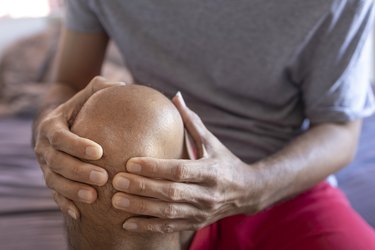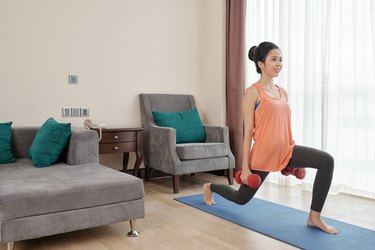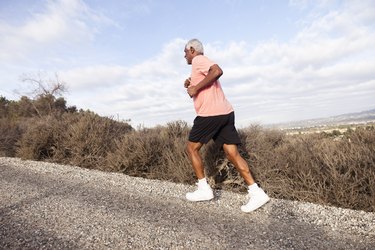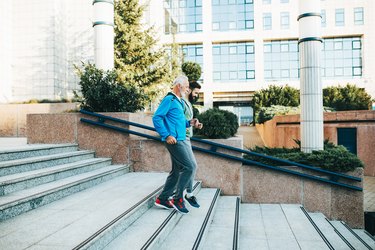
Waking up with unexpected knee pain can really take the spring out of your step first thing in the morning.
Once you've ruled out something like bruising from bumping into furniture on a late-night trip to the bathroom, you might start running through the list of other possible causes of knee pain to help determine your treatment options — and whether or not you'll still be able to tackle the workout you had planned for today.
Video of the Day
Video of the Day
Here, Joshua Goldman, MD, an orthopedic surgeon and associate clinical professor at UCLA, explains why you might wake up with knee pain and what to do when it happens.
Warning
Waking up with knee pain is not always benign or simple to fix. If your knee pain also radiates into your foot, your pain might be related to a nerve issue. Dr. Goldman recommends a comprehensive neurologic evaluation if that's the case.
If severe knee pain wakes you in the middle of the night, you may need an X-ray of the area to rule out other serious issues, including bone cancer.
1. You Have Runner’s Knee
An ache in the front of the knee and around your kneecap in the morning can be a sign of runner's knee, or patellofemoral pain syndrome (PFPS), according to the American Academy of Orthopaedic Surgeons (AAOS). It happens when the kneecap gets misaligned and no longer sits in the trochlear groove — the notch at the end of the femur bone.
This type of injury can result from overuse of the knee or under-conditioning of the hip and inner quadricep muscles. While PFPS is quite common in runners, it can also occur from many other sports and activities.
Fix It
Icing your knee before bed can reduce swelling and minimize overnight symptoms. You can treat persistent discomfort with the standard RICE method — which stands for rest, ice, compression and elevation — by staying off the affected leg, applying ice at 20-minute intervals, wrapping it lightly with a bandage and elevating your knee above your heart whenever possible, according to the AAOS.
In the long term, physical therapy can correct any hip weakness or quadricep imbalance to help with recovery and prevent future injury.
2. You Have Iliotibial Band Syndrome
Iliotibial band syndrome, or ITBS for short, is similar in origin to runner's knee. While this pain is more common during activity, it can also manifest as aching overnight.
The IT band is a thick, fibrous band of tissue that starts in the front of the hip, runs along the side of the thigh and anchors on the outside of the tibia (shin bone) below the knee, Dr. Goldman explains. If you have weak hip muscles, the IT band will overcompensate to try to stabilize the leg. As it does so, it can create friction over the front of the knee, which manifests as a sharp, stabbing pain.
Fix It
Knee pain from ITBS is treated with ice at the site of pain, stretching of the IT band and physical therapy to correct the hip weakness. Use a foam roller on the outer thigh before bed to help relax the IT band and prevent pain when you wake up.
3. You Have Osteoarthritis
As we reach middle age, we often see signs of cartilage degeneration in the knee from old injuries or genetic predispositions. This is called osteoarthritis, per the Cleveland Clinic.
It's fairly normal to wake up with creaky joints, especially as we age. If your discomfort eases as you go about your morning routine, there's no cause for further investigation. But, if your morning knee pain aches around the kneecap, along the joint line in the middle of the knee and on either side of the knee, it could be caused by osteoarthritis.
This pain is classically worse in the morning upon waking and improves over the course of the day as the joint "loosens up," Dr. Goldman explains.
Fix It
Knee osteoarthritis can be diagnosed with an X-ray. While there is no “cure” for degenerative changes in the knee, there are several treatments that can help minimize symptoms including anti-inflammatory medication, steroid injections, hyaluronic acid injections, platelet-rich plasma injections and knee replacement surgery, Dr. Goldman says.
Lifestyle changes can help ease morning knee pain and keep you more comfortable throughout the day as well. Try these steps, from Rhode Island Hospitals and Health Services, to get the creaks out of your joints:
- Circle your ankles
- Extend your legs in bed
- Bend at the knee and hip before getting out of bed
- Follow up with a hot shower to ease your muscles
- Add in periods of gentle activity throughout the day
Pay attention to what you eat, too: Certain foods can worsen inflammation or affect how easy it is to fall asleep if eaten too close to bedtime. Being mindful of your diet may help ease stiffness upon waking.
Tip
Dr. Goldman points out that hip osteoarthritis can masquerade as knee pain. If you are an older adult with normal knee X-rays, talk to your doctor about getting a hip X-ray as well.
4. You Tore Your Meniscus
If you wake up with a swollen knee that delivers a sharp pain when you step on it or twist it, you might be dealing with a torn meniscus — i.e., torn cartilage in the knee, Dr. Goldman says.
The meniscus — cartilage that serves as a shock absorber and cushion between the bones of your knee — is a commonly injured part of the knee. A tear can happen to anyone, regardless of fitness level, ability or age, from contact sports, a fall or even an awkward twist as you stand up from a chair.
Most often, you'll hear a popping sound when it tears. But sometimes, you won't notice the injury for two to three days, when it begins to swell or cause pain upon waking in the morning, according to the AAOS.
Fix It
If you suspect you might have a meniscal tear, apply ice and stay off the affected leg. If your mobility is limited or the pain and swelling increase, you'll need to see an orthopedist.
An orthopedic visit will likely begin with a McMurray test, a series of manipulations of the leg to determine the areas of pain and discomfort, according to the Cleveland Clinic. This will likely be followed by an MRI or other imaging test.
A doctor might prescribe the RICE method along with anti-inflammatory medication or possibly arthroscopic surgery, depending on the type and location of the injury.
5. You Tore a Ligament
If your knee locks or buckles and you have trouble supporting your weight when you stand, especially when you first get up out of bed in the morning but also throughout the day, it might be a sign of a significant tear in the anterior cruciate ligament, or ACL, per the Mayo Clinic.
If you suspect you have a torn knee ligament, immediately apply the RICE method and consult a doctor.
Fix It
A torn knee ligament can't heal on its own and requires immediate medical attention. Follow-up treatments may include physical therapy or surgery.
- AAOS: "Common Knee Injuries"
- AAOS: "Patellofemoral Pain Syndrome"
- The Mayo Clinic: "ACL Injury"
- Total Joint Center Team at Rhode Island Hospital: "Joint Pain and Stiffness in the Morning and How To Reduce It"
- UCLA Health: "Joshua T. Goldman"
- The Cleveland Clinic: "Osteoarthritis"
- AAOS: "Meniscus Tears"
- The Cleveland Clinic: "McMurray Test"
Is this an emergency? If you are experiencing serious medical symptoms, please see the National Library of Medicine’s list of signs you need emergency medical attention or call 911.




